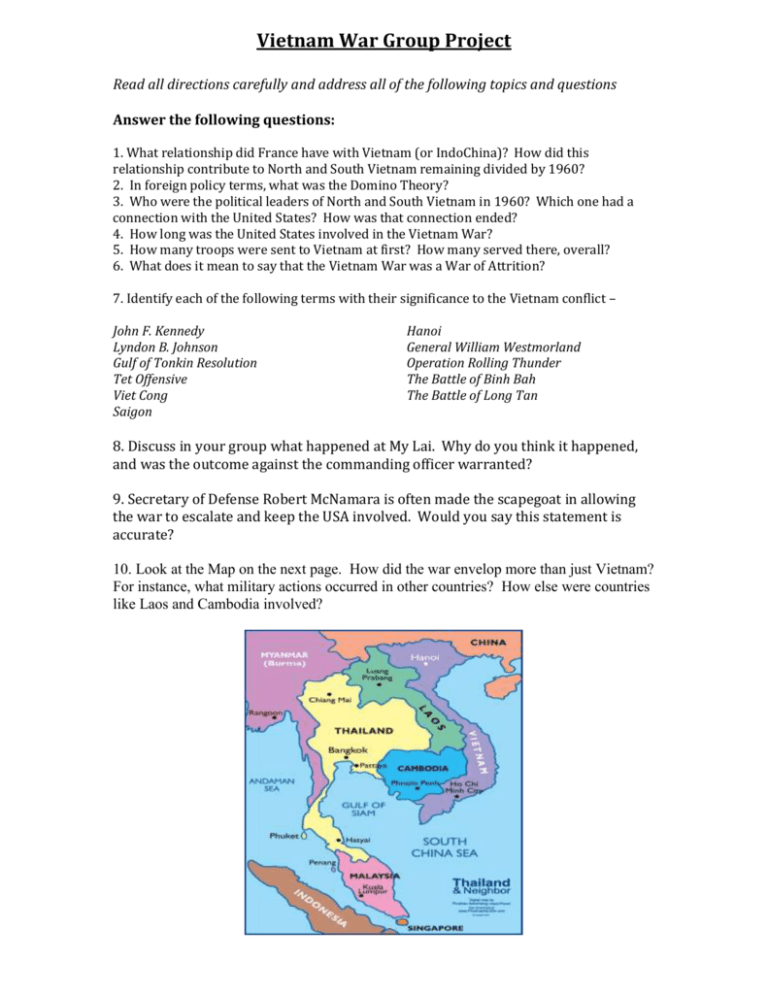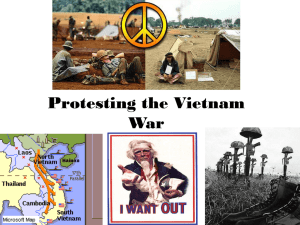
Vietnam War Group Project
Read all directions carefully and address all of the following topics and questions
Answer the following questions:
1. What relationship did France have with Vietnam (or IndoChina)? How did this
relationship contribute to North and South Vietnam remaining divided by 1960?
2. In foreign policy terms, what was the Domino Theory?
3. Who were the political leaders of North and South Vietnam in 1960? Which one had a
connection with the United States? How was that connection ended?
4. How long was the United States involved in the Vietnam War?
5. How many troops were sent to Vietnam at first? How many served there, overall?
6. What does it mean to say that the Vietnam War was a War of Attrition?
7. Identify each of the following terms with their significance to the Vietnam conflict –
John F. Kennedy
Lyndon B. Johnson
Gulf of Tonkin Resolution
Tet Offensive
Viet Cong
Saigon
Hanoi
General William Westmorland
Operation Rolling Thunder
The Battle of Binh Bah
The Battle of Long Tan
8. Discuss in your group what happened at My Lai. Why do you think it happened,
and was the outcome against the commanding officer warranted?
9. Secretary of Defense Robert McNamara is often made the scapegoat in allowing
the war to escalate and keep the USA involved. Would you say this statement is
accurate?
10. Look at the Map on the next page. How did the war envelop more than just Vietnam?
For instance, what military actions occurred in other countries? How else were countries
like Laos and Cambodia involved?
Read the editorial from Walter Cronkite. Answer the questions that
follow.
CWA 4.9 – Walter Cronkite Editorial (Page 1 of 2)
Background: Several years after the war in
Vietnam was “escalated,” American
military officials and
government leaders
continued to tell the public that a victory
over the Communists was within
sight.
However, in the early months of 1968, in
what became known as the Tet Offensive,
the North
Vietnamese Army conducted a
coordinated attack of dozens of major
cities in the South. Television
cameras
recorded American and Vietnamese
soldiers fighting in this gruesome
seemingly guerilla style
of urban warfare.
Watching these scenes on television
disturbed many Americans. Although the
U.S.
and South Vietnamese forces were
able to defeat the North, the battles
damaged American support for
the war; in
the days and weeks after Tet many
Americans came to believe that the war
could not be won
and that it was therefore not worth fighting. Below is an editorial from Walter Cronkite, a popular
journalist who served as anchor of CBS News for from 1961 to 1981, who was voted the “most trusted man
in America” in 1972. He wrote about his perceptions and conclusions about the war, which influenced the
way many felt about it.
“Tonight, back in more familiar surroundings in New York, we'd like to sum up our findings in Vietnam,
an analysis that must be speculative, personal, subjective. Who won and who lost in the great Tet offensive
against the cities? I'm not sure. The Vietcong did not win by a knockout, but neither did we. The referees of
history may make it a draw.... On the political front, past performance gives no confidence that the [South]
Vietnamese government can cope with its problems, now compounded by the attack on the cities. It may
not fall, it may hold on, but it probably won't show the dynamic qualities demanded of this young nation.
Another standoff.
Vietnam. Walter Cronkite of CBS interviewing Professor Mai of the University of Hue., 02/20/1968.
Source: National Archives, ARC Identifier 532481.
We have been too often disappointed by the optimism of the American leaders, both in Vietnam and
Washington, to have faith any longer in the silver linings they find in the darkest clouds.... For it seems
now more certain than ever that the bloody experience of Vietnam is to end in a stalemate. This summer's
almost certain standoff will either end in real give-and-take negotiations or terrible escalation; and for every
means we have to escalate, the enemy can match us, and that applies to invasion of the North, the use of
nuclear weapons, or the mere commitment of one hundred, or two hundred, or three hundred thousand
more American troops to the battle. And with each escalation, the world comes closer to the brink of
cosmic disaster.
To say that we are closer to victory today is to believe, in the face of the evidence, the optimists who have
been wrong in the past. To suggest we are on the edge of defeat is to yield to unreasonable pessimism. To
say that we are mired in stalemate seems the only realistic, yet unsatisfactory, conclusion.... [I]t is
increasingly clear to this reporter that the only rational way out then will be to negotiate, not as victors, but
as an honorable people who lived up to their pledge to defend democracy, and did the best they could.
Source: Reporting Vietnam: Part One: American Journalism 1959- 1969 (1998), pp. 581-582.
http://www.digitalhistory.uh.edu/active_learning/explorations/vietn am/cronkite.cfm
Questions for Group Discussion:
1. In this address, to whom do you think Cronkite was talking?
2. According to Cronkite, who won the recent battles during the Tet Offensive? Why was there uncertainty
surrounding it?
3. How does Cronkite think the war will end? Why?
4. What did Cronkite mean when he said “mired in a stalemate?”
5. In general, what impact do you think television can have on the public’s perception of war? What role
do journalists play in public opinion?
The Vietnam War
Copyright © 2013, The Regents of the University of California, All Rights
Reserved
More On The War at Home
1. Research how the military draft impacted Americans during the Vietnam War. How did it work?
Were Americans willing to participate? Why/Why not?
2. The two most prolific protests or series of events occurred at the 1968 Democratic National
Convention and on college campuses across the country from the late 1960s in the 1970s. Why were
these places targeted by protesters? What occurred in Chicago in 1968? Find two or three examples
of protests on college campuses that were notable and important to the protest movement.
3. The news media and video recording took a different role in Vietnam than in previous wars.
Describe how the war was presented. How would its presentation shape Americans’ views at home?
Resources to Start….
http://www.history.com/topics/vietnam-war/vietnam-war-history
http://news.bbc.co.uk/2/shared/spl/hi/asia_pac/05/vietnam_war/html/introducti
on.stm
Timeline - http://www.english.illinois.edu/maps/vietnam/timeline.htm
Photo Timeline - http://www.cnn.com/2015/04/22/world/gallery/vietnam-wartimeline/
Chicago ’68 http://www.cnn.com/ALLPOLITICS/1996/conventions/chicago/facts/chicago68/i
ndex.shtml



![vietnam[1].](http://s2.studylib.net/store/data/005329784_1-42b2e9fc4f7c73463c31fd4de82c4fa3-300x300.png)





